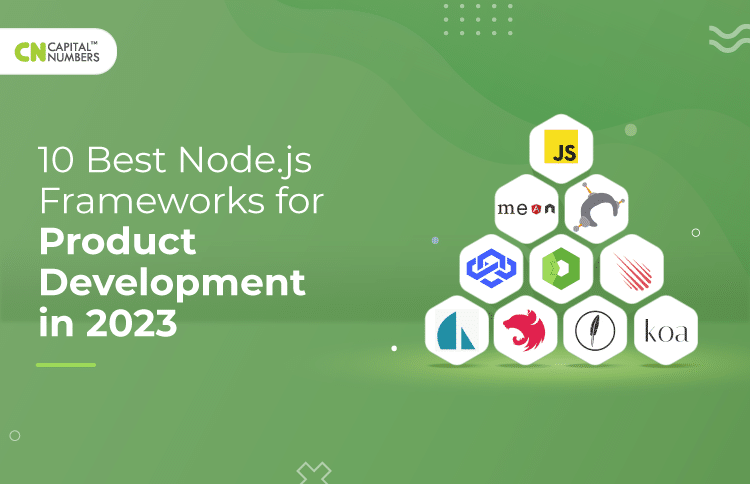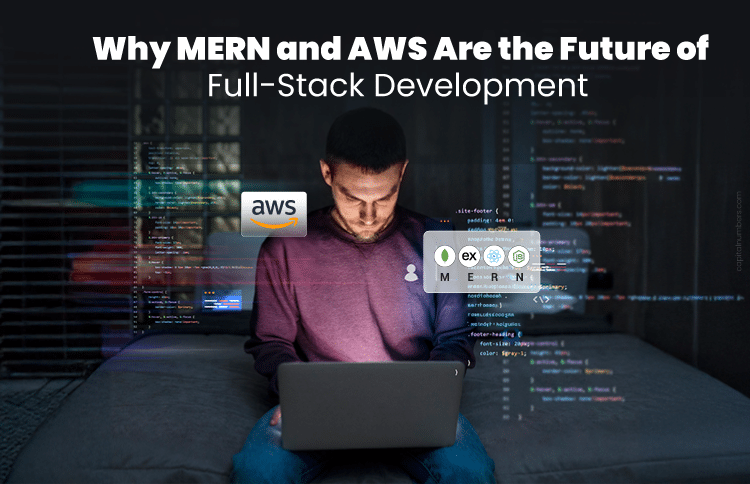10 Best Node.js Frameworks for Product Development in 2023
Table of Contents
Node.js is a versatile JavaScript runtime environment that drives numerous real-time web applications, including online games, messengers, and video platforms. Renowned technology companies like Netflix, Uber, and Trello rely on Node.js to develop dynamic user interfaces and robust server-side environments. To unlock the full potential of Node.js, businesses often seek to hire Node.js developers skilled in utilizing its extensive range of frameworks.
However, with numerous options available, choosing the ideal framework for your project can take time and effort. Here, we will explore the top Node.js frameworks for 2023 and guide you toward making an informed choice. Read on to discover the perfect framework that aligns with your project’s needs and helps you create exceptional applications.
What Are Node.js Frameworks?
Node.js frameworks are software tools and libraries that provide a structured and efficient way to build web applications and APIs using Node.js. These frameworks offer a range of features, utilities, and conventions that simplify the development process and promote best practices.
Why Use Node.js Frameworks?
Using these frameworks help you in several ways, including:
- Faster and more efficient development process.
- Scalability to handle high traffic loads.
- Modularity and code reusability for improved maintainability.
- Real-time capabilities for interactive and dynamic applications.
- Large ecosystem and community support.
- High-performance applications with non-blocking I/O.
Types of Node.js Frameworks
Node.js frameworks can be categorized into three primary types based on their support for specific use cases throughout the development lifecycle.
Ⅰ. MVC (Model-View-Controller) Frameworks
MVC frameworks follow the Model-View-Controller architectural pattern. They separate the application into three distinct components:
- Model: Represents the app’s data and business logic.
- View: Handles the presentation layer and user interface.
- Controller: Manages the data flow and acts as an intermediary between the model and view.
These frameworks provide a structured approach to application development, improving code organization and modularity. Generally, they offer features for routing, middleware management, and handling HTTP requests and responses.
Ⅱ. Full-Stack MVC Frameworks
Full-Stack MVC frameworks build upon the MVC pattern and provide a more integrated solution. They offer comprehensive tools and features to develop an application’s server-side and client-side components. These frameworks often include built-in support for real-time communication, database integration, and front-end rendering. Also, they provide end-to-end solutions for building dynamic web applications.
Ⅲ. REST API Frameworks
REST API frameworks focus on building APIs rather than complete web applications. They provide tools and conventions to develop robust and scalable APIs following Representational State Transfer (REST) principles. REST API frameworks simplify the creation of RESTful endpoints, handling request routing, request validation, and response generation. These frameworks are commonly used to develop back-end services that serve as a back-end for front-end (BFF) applications or mobile applications.
These Node.js framework types serve different development needs, from building complete web applications to developing APIs. The framework choice depends on your project’s specific requirements and the desired development approach.
What Are the Popular Node.js Frameworks?
There are several popular Node.js frameworks available, each with its unique features and advantages. Here are some of the most popular Node.js frameworks:
1. Express.js
Express, the most starred Node.js framework on GitHub, is a high-performance, asynchronous, and robust framework. It excels in designing single-page, multi-page, and hybrid web applications. With its MVC architecture, Express enables efficient client-server interaction, leveraging the single-threaded nature of Node.js.
Key Features
- Fast server-side development packages
- High test coverage
- Supports multiple template engines
- Highly performant
- Easy content negotiation with URLs and HTTP protocol
- Easily integrates with SQL and NoSQL databases
2. Nest.js
Nest.js is a popular Node.js framework used for building efficient server-side apps, ranked second to Express in GitHub stars. It supports TypeScript and JavaScript, integrates well with Express.js, and supports elements of Object-Oriented Programming (OOP), functional programming, and reactive programming.
Key Features
- Easy integration with frameworks like Express
- Compatibility with Angular on the front-end
- Small learning curve for beginners
- Large developer community
- Highly systematic and easy-to-use external libraries
3. Meteor.js
It is an isomorphic and open-source Node framework specific to JavaScript. The framework allows rapid prototyping and the production of cross-platform codes. Compatible with multiple operating systems, Meteor.js is ideal for developing simple yet modern and efficient web apps.
Key Features
- Isomorphic and cross-platform framework
- Full-stack solution
- Rapid prototyping with command-line interface (CLI)
- Lightweight but feature-rich
- Easy integration with other frameworks
4. Koa.js
Known as a lightweight alternative to Express, Koa is renowned for its cascading middleware architecture, making it ideal for developing web applications. It offers the ability to maintain multiple versions of webpage content for different users, enhancing customization. With its modern design and robust error handling, Koa is a rapidly evolving framework that continues to expand its capabilities.
Key Features
- Better personalization through cascading middleware
- Resolution of code inconsistencies to ensure better maintainability
- Ability to leverage Express’s rich ecosystem of libraries and packages
5. Sails.js
Suitable for building high-end and complex web applications, Salis is an MVC framework, that supports modern, data-oriented development. It is known for its compatibility with various databases and easy integration with Node Package Manager (npm). Also, it is famous for its ability to auto-generate REST APIs.
Key Features
- Object-relational mapping for compatibility with databases
- Reusable security policies
- Integration with Express and Socket.io
- Support for Angular
6. Feathers.js
Feathers.js is a lightweight and flexible JavaScript framework for building real-time applications and RESTful APIs. It provides a streamlined and intuitive development experience by offering tools and abstractions that simplify the creation of scalable and efficient applications.
Key features of Feathers.js
- Real-time communication and updates.
- Modular and extensible architecture.
- Database flexibility and compatibility.
- Seamless client-server data synchronization.
- Built-in authentication and authorization support.
- Scalable and high-performance capabilities.
- Developer-friendly with intuitive API and documentation.
7. Hapi.js
Hapi.js is a powerful and flexible JavaScript framework used for building web applications and APIs. It provides a robust foundation for creating server-side applications focusing on scalability, modularity, and developer-friendly features.
Key Features
- Flexible and powerful routing system
- Modular and extensible plugin architecture
- Robust caching capabilities
- Flexible logging mechanism
- Built-in testing utilities
- Vibrant community and extensive documentation
8. LoopBack.js
LoopBack.js is a powerful and highly extensible JavaScript framework that simplifies the process of building scalable and feature-rich applications and APIs. It provides a comprehensive set of tools and features that enable developers to easily create robust server-side applications.
Key Features
- Model-driven development with automatic API
- API composition for seamless integration
- Real-time capabilities with WebSocket integration
- Extensibility through middleware components
- Command-Line Interface (CLI) for automated tasks
- Comprehensive documentation and active community support
9. MEAN.js
MEAN.js is a full-stack JavaScript framework that combines several powerful technologies, including MongoDB, Express.js, AngularJS, and Node.js. It provides a cohesive and integrated environment for building robust, scalable, secure, and dynamic web applications.
Key Features
- Modular structure for code organization
- MVC architecture for separation of concerns
- Emphasis on RESTful API development
- Built-in tooling for project management
- Active community and rich ecosystem of plugins
10. Total.js
Total.js is a powerful and extensible web application framework written in JavaScript. It simplifies the development process by providing a comprehensive set of tools and features. Total offers over 100 services for JavaScript development, code sharing, cloud computing, and UI development.
Key Features
- Modularity for code organization and reusability
- Model-View-Controller (MVC) architecture
- Server-side and client-side rendering options
- Real-time communication through WebSockets
- Built-in authentication
- Error handling and logging mechanisms
How to Choose the Best Node.js Framework?
Choosing the best Node.js framework depends on several factors. Here are some key considerations to help you make an informed decision:
- Project Requirements: Understand the needs of your project, including scalability, real-time capabilities, and database integration.
- Community Support: Check the size and activity of the framework’s community, availability of documentation, and support channels.
- Learning Curve: Assess the framework’s complexity and the availability of learning resources for your team.
- Scalability and Performance: Evaluate the framework’s ability to handle concurrent requests, support clustering, and integrate with caching mechanisms.
- Ecosystem and Plugins: Consider the availability of plugins, modules, and integrations that enhance productivity and provide additional functionality.
- Security and Authentication: Assess the framework’s built-in security features and how easily they can be implemented.
- Long-term Maintenance and Support: Evaluate the framework’s long-term viability, responsiveness to issues, and popularity in the developer community.
- Project Constraints: Consider budget, project timeline, and team size when selecting a framework.
Also read: Choosing the Right Framework for Your Web Applications
Bottom Line
Node.js frameworks provide a solid foundation for building efficient, scalable, and feature-rich applications. The top 10 frameworks mentioned here cater to various development needs and preferences. Developers can choose a framework based on project requirements, community support, learning curve, scalability, and ecosystem. Whichever framework you choose, leveraging the power of Node.js frameworks will undoubtedly accelerate your development process and help you build impressive applications effectively.
If you’re looking for an award-winning Node.js development company, choose Capital Numbers. Equipped with 700+ in-house tech talents, we offer customized solutions at affordable prices. Want to discuss your project? Book a call today!















